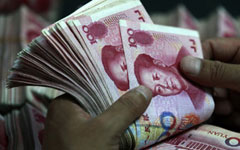Editor's note: Cheap credit has been a major tool for the Chinese government to fuel growth, but it has become less effective and more risky over the years. Now the top decision-makers are trying to solve the problem on a deeper level by reshaping the country's fiscal system, or the government's own pocket, in pursuit of not only sustainable growth but modernized governance as well.
China Daily talked to experts of fiscal science at ministries, think tanks and universities, to hear what they had to say about the impact of the reform on officials, businesses and ordinary people.
The first article in a series of three will discuss how the reform will reshape the relationship between China's central and local authorities, and redefine the boundaries between the government and the market.
 |

|
Optimizing the fiscal relationship between the central and local governments was among the three major tasks for building a fiscal system by 2020, which was a goal set by the country's top leaders in late June.
"This means to establish a fiscal system in which the government's expenditures match the revenue," Finance Minister Lou Jiwei explained.
In the first five months, the central government's revenue totaled 2.89 trillion yuan ($466 billion), while that of local governments was 3.23 trillion yuan. At the same time, it spent only 879.5 billion yuan, while local governments were responsible for 4.38 trillion yuan of the expenditure.
"Globally, fiscal revenue of central governments normally accounts for more than 70 percent of the total government revenue; in the United States, the level is around 65 percent," Lou said.
But in China, the central government's revenue normally accounts for less than 50 percent of the total, and it is responsible for only about 20 percent of public expenditures.
The finance minister said that the structure will be optimized, with the central government taking in more taxes as well as more spending duties to improve the social security system, while giving some revenue back to local governments to fill in the expenditure gap.
"This will be a fundamental change for China's fiscal system," said Tang Yunyi, a researcher with the Institute of Economics at the Shanghai Academy of Social Sciences.
